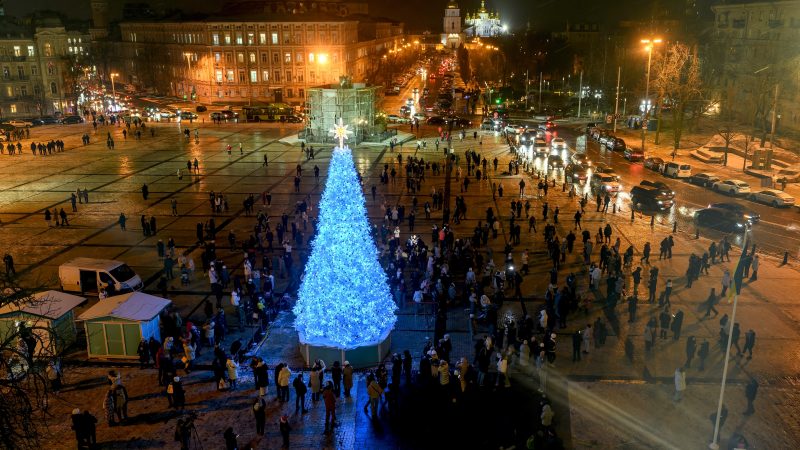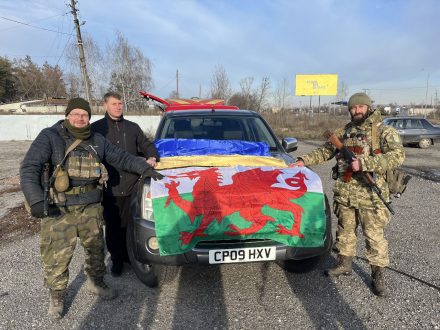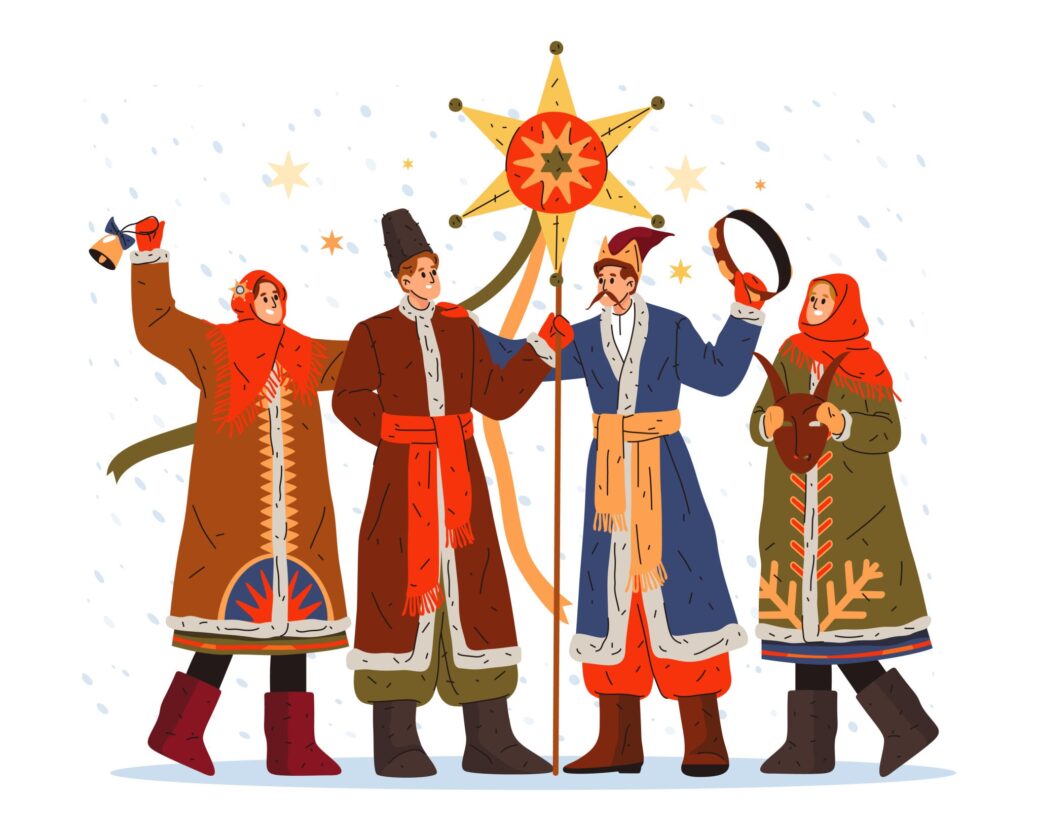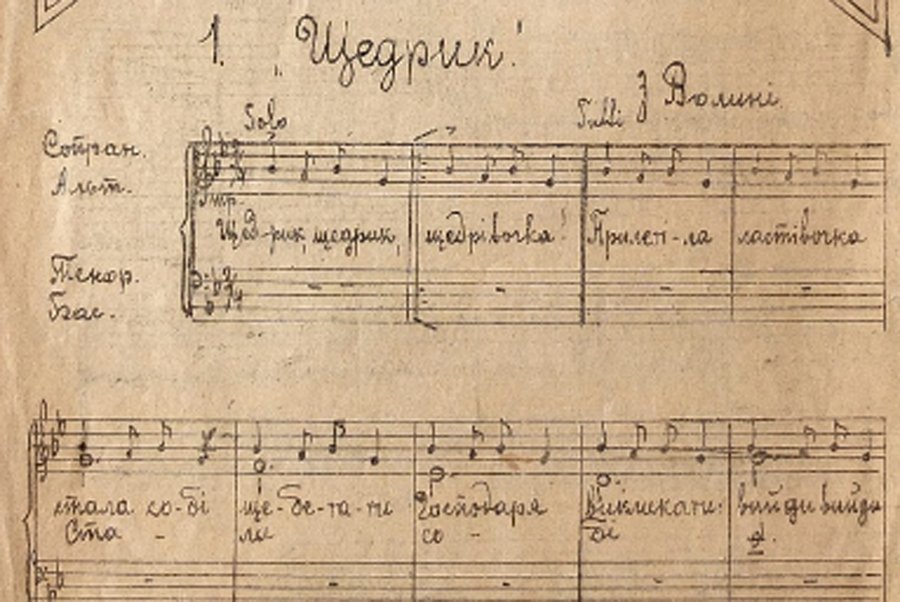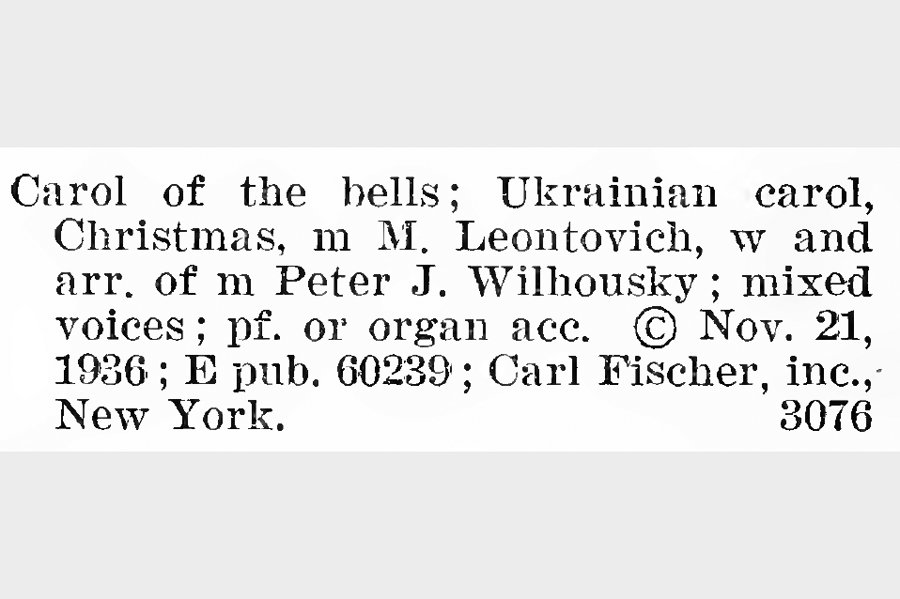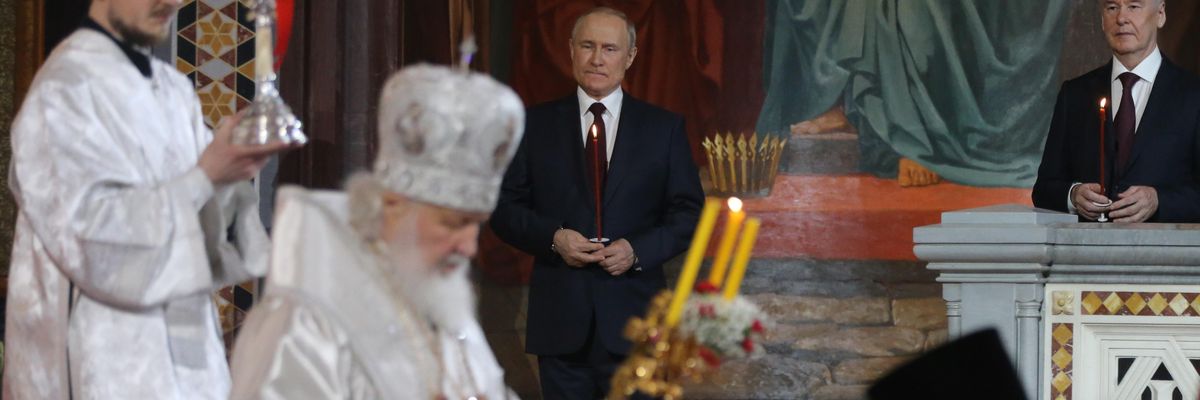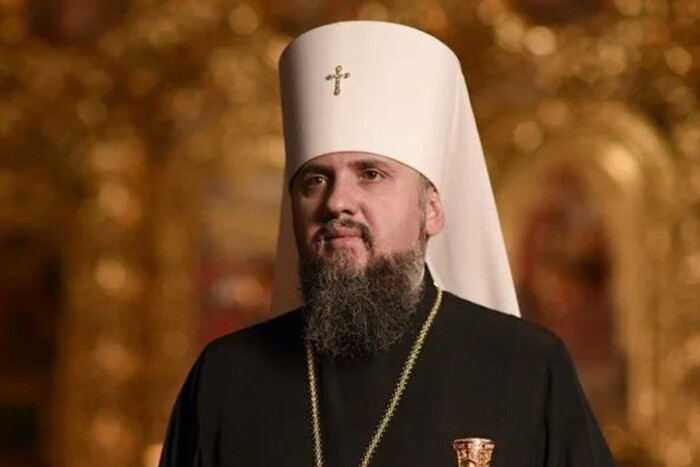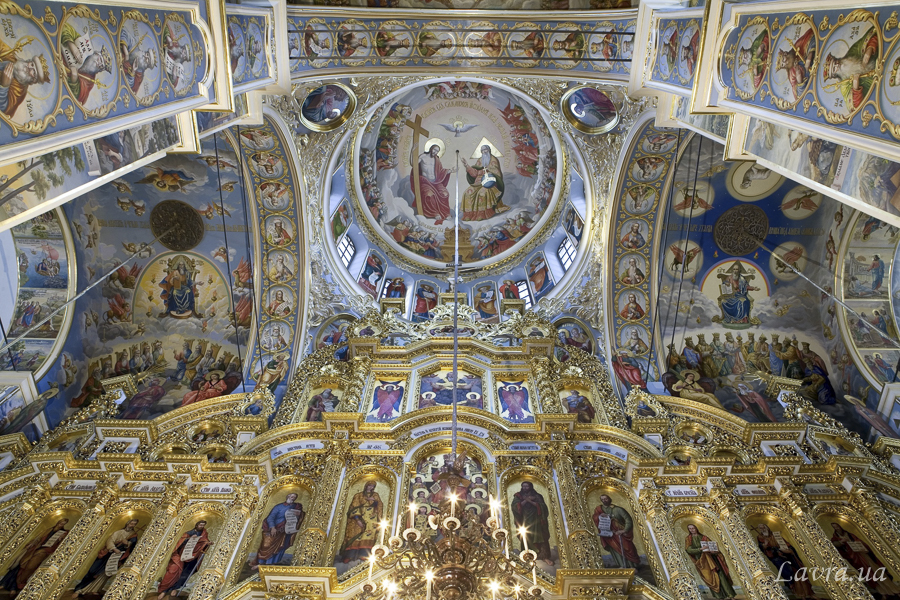Merry Ukrainian Christmas. Z Rizdvom Khrystovym!
Well at least here in Western Canada, the largest North American Diaspora of Ukrainians, who kept and grew their identity while in exile. In the rest of the world it is Epiphany and the Orthodox Christmas.
Ukrainian Christmas is of course not a Christian celebration at all but rooted in the old pagan traditions. The twelve course dinner we eat is vegetarian, saving of the meat slaughtered at harvest, for the mid winter, late Feburary early March coinciding coincidentally with Easter/Spring. It represents the circle of the year quartered.
My relatives once explained the twelve seasons were the Apostles. A bit of syncretism if not outright recuperation by the dominant Religious State/State Religion.
In reality it is part of the pagan roots of all Ukrainian culture and its motifs.
The twelve course meal is celebrated with friends, relatives and the community, with local carolers visiting, not unlike Mummers in Newfoundland, and a priest blessing the house with water, salt and a evergreen branch.
The meal itself is part of the old pagan gift economy, where we shared the wealth of the harvest at this dark cold part of the year, feasting in preparation for the spring.
The symbolism of the birds on the babkas and paskas, the sacred breads of the sun which are made from the wheat, the life of the earth, are with us still and used at Christmas, Easter, for weddings and funerals.
Rich in pagan heritage, Ukrainians are again embracing their pagan past, and its vital link with today.
So from a heathen and a pagan I say to you,
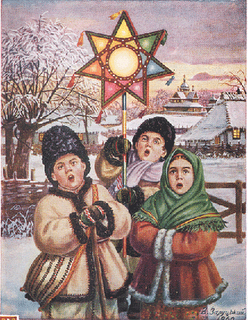 Recited After Caroling
Recited After Caroling
vinchovanye from the Carpathian Mountains (rec. by Vol. Shukhevych. Hutsul'shchyna. Lviv: NTSh, 1904. v.4)
English Translation: (two separate very old greetings combined)
Wishing all of you health, wealth, happiness, bliss,
for you and your family, your garden, your farm animals,
even your bees, and may there be a wedding soon in your family!
Dai zhe ty, Bozhe, ta v khati sytno,
U khati sytno, na dvir prybytno.
Dai zhe ty, Bozhe, na khati zilia,
Na khati zilia, v khati vesilia!
V pasitsi bzholy yz royechkamy,
Yz royechkamy, paroyechkamy!
Oi dai Bozhe!
Vinchuyemo ty sh'ystiem-zdorovyym,
Sh'ystiem-zdorovyym, Rizdvom Khrystovym!
Dai zhe ty bozhe, v horodi zelo,
V horodi zelo, v khati veselo!
Podai zhe, Bozhe, vsim zdorovyuchko,
Na khudobochku, na dvir sh'yst'ychko,
Na khudobochku, na rohovuyu,
Na chel'ydochku, na domovuyu!
Oi dai Bozhe!
On Christmas Eve, called "Sviat Vechir" (Holy Eve) in Ukrainian, the family gathers together to share a traditional meal and to sing carols. It is customary to wait until the evening star appears in the sky, as this is thought to represent the star of Bethlehem which guided the Wise Men to the Manger. The meal is called "Sviata Vecherya" which means "holy supper".
It is always a lenten meal as there is a fasting time which leads up to the Feast of Christmas on the 7th. The most important food which must be present and usually sits in the center of the table is called "Kutia". It is a sweet pudding made of boiled wheat, honey, nuts and poppy seeds. The other traditional food is a fruit compote of simmered dried fruits called "Uzvar". These two foods symbolize the bounty of the harvest and offer a prayer for a plentiful harvest to come in the New Year.
A chair and place setting is usually left empty to symbolize the hope that the souls of deceased relatives will visit and partake of the holy meal along with the family. Pagan Ukrainians worshipped their ancestors and believed that their spirits could be propitiated in order to benefit the family.

"The Tree of Life, the Sun, the Goddess: Symbolic Motifs in Ukrainian Folk Art," now at the new Ukrainian Museum, taught me how to "read" a bride’s costume. It allowed me to see symbols that evolved from at least as far back as the Linear and Trypillian cultures from 6000-3000 BCE.
All these pagan symbols reside in textiles and ornaments dating from the late 19th to early 20th century from a country that was converted to Christianity in 988 CE.
The goddess motif, a torso, often vegetative with curved arms held on either side of the head, can be found on the bottom edge of a cream-colored coat (svyta) from the 1920s or recognized in more abstract forms on painted Easter eggs (pysanky). A goddess figure often shows up in textiles as rhomboids, where hook-like extensions take the place of uplifted arms. In the same manner, she appears in sashes and in the embroidery on the sleeves of women’s shirts and ritual cloths.
The tree-of-life designs play an important role in many cultures. A pillar or tree, an axis mundi, is seen as connecting the world above (gods or benevolent spirits), the earth (man’s domain) and the underground (ancestors or evil spirits).
In Ukrainian folk art, the tree-of-life is often found on ritual cloths, usually with red embroidery on a white ground. These cloths were found everywhere in traditional villages. Some were hung in houses at weddings and births; others were placed on coffins; still others were put atop markers at the edge of small towns to welcome visitors. One ritual cloth (rushnyk) from the 1930s is a riot of tree-of-life motifs along with other fertility symbols -- flowers, vines and birds.
Unveiling the Mother Goddess from her 4000-year Black Earth Cover
It is awesome to think that while Sumerian culture had only begun developing and when the Egyptian pyramids were yet to be built, dozens of Trypilian towns in Ukraine had already sunk into oblivion and their ruins were covered with the grass of the forest-steppe stretching between the Dniester and Dnipro rivers.
 These old Ukrainian fertility gods are located in Kyiv at the Ukraine History Museum, near St. Andrew’s church.
These old Ukrainian fertility gods are located in Kyiv at the Ukraine History Museum, near St. Andrew’s church. (The statues are outdoors, and have been placed under the hoods in order to reduce wear from the elements.) Many--perhaps even most--religions and churches encourage fertility. Historically, fertility was an important way to maintain the continuity of the community. This tradition continues today, of course.
The AnthropogeneThere was a time when cities were being built in the Southern Ukraine long before the kingship descended to Eridu in Sumer. We are accustomed to thinking that "history began in Sumer", but there is a time of cities and peoples that have been lost and re-discovered. We don't need to look for a mythical Atlantis to discover lost realms.

Around 5400 BC there must have been a great forest in the Southern Ukraine and while this is pure speculation, the people of the Black Sea Diaspora must have made made their migratory ingress into these territiories, moving up the great rivers of the Danube, the Dnieper and the Dneister. To the ancients who were making the switch from a nomadic hunter-gatherer existence to an agrarian lifestyle, the rivers were the highways, the safest way to travel and the riverbanks were the best place to grow grains.
In case the term Black Sea Diaspora doesn't mean anything, we now know that around 5600 BC the New Euxine Lake, as that freshwater sea was known, was permanently changed by the opening of the breaching of the Bosphorus Straits. There is quite a bit of controversy on the exact manner of how this happened. Was it gradual? was it sudden? Was there a prior flooding from the Caspian Sea? etc.... But what we do know, thanks to Robert Ballards efforts in undersea archeology, is that there were human settlements in the shallow regions of the northern Black Sea that are now 140 meters underwater.
"Just as every tree is different in a forest and you have to learn to recognize it, so every person is different and has its own place, time and unique voice which you must also learn to recognize. The idea that today we are destroying the forest, uprooting trees, and uprooting humanity, is central to the production of
Lesia Ukrainka's Forest Song, the Ukrainian-America collaborative project of the Yara Arts Group from La Mama Theatre in New York and the Kurbas Theatre from Lviv..

Larysa Petrivna Kosach-Kvitka (February 25, 1871 [O.S. February 13] – August 1, 1913 [O.S. July 19]) better known under her literary pseudonym Lesya Ukrainka , was one of Ukraine's best-known poets and writers and the foremost woman writer in Ukrainian literature. Ukrainka also wrote epic poems, prose dramas, prose, several articles of literary criticism, and a number of sociopolitical essays. She was best known Lisova pisnya (1912; The Forest Song), whose characters include mythological beings from Ukrainian folklore. Ukrainka actively opposed Russian tsarism and was a member of Ukrainian Marxist organizations. In 1902 she translated a Communist Manifesto into Ukrainian. She was briefly arrested in 1907 by tsarist police and remained under surveillance thereafter.
 And the ancient godess returns in modern form;Yulia Tymoshenko: Goddess of the Orange Revolution As I also commented on here.
And the ancient godess returns in modern form;Yulia Tymoshenko: Goddess of the Orange Revolution As I also commented on here.
See
Christmas
Pagan
UkraineFind blog posts, photos, events and more off-site about:
Ukrainian Christmas, , Z Rizdvom Khrystovym, food, pagan, Ukraine, Orthodox Christmas, christmas eve,







